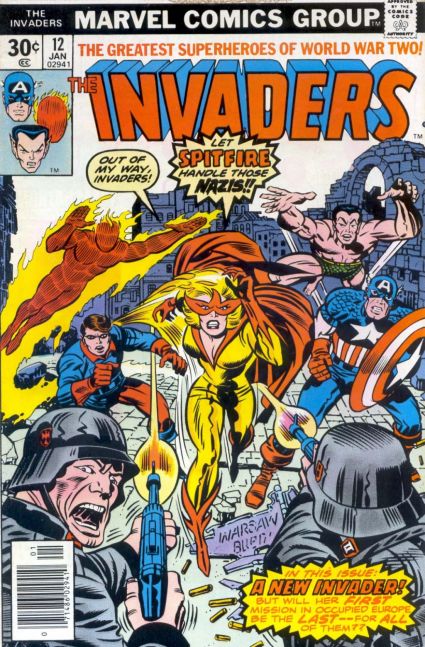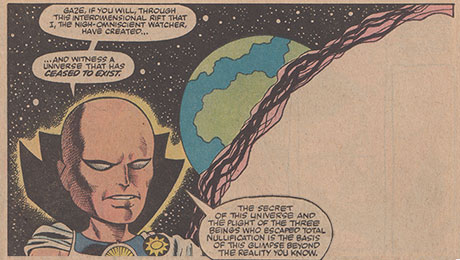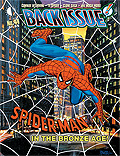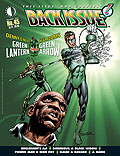Invaders #12 (January 1977)
"To the Warsaw Ghetto!"
Roy Thomas-Frank Robbins/Frank Springer
Doug: I'll be proceeding with caution today, friends. Two reasons: No. 1 is the presence of Frank Robbins on the penciling. You know by now how I feel about that (his writing aside, which I enjoyed on many a Batman yarn). No. 2 is the title of the story. Our long-time readers know that I have done educational contract work for the United States Holocaust Memorial Museum since 2005. I'm just a bit leery to see how the Warsaw Ghetto (and largely the Holocaust) will be portrayed by the folks at Marvel.
 Fingers crossed. So the next obvious question would be, "But wait, Doug -- didn't you read this mag as a 10 1/2-year old?" The answer would be "yes", but the memory would say "Uhhhhhhhh...." You know what I mean. In spite of my strong reservations about the art on this title I was a regular reader when I could find it. I think I came on with the Liberty Legion crossover in #5 and stayed when I could through the end. I was never so happy to see Alan Kupperberg! I'll be reading and scanning from the Invaders Classic, Volume 2 trade paperback. Onward, then.
Fingers crossed. So the next obvious question would be, "But wait, Doug -- didn't you read this mag as a 10 1/2-year old?" The answer would be "yes", but the memory would say "Uhhhhhhhh...." You know what I mean. In spite of my strong reservations about the art on this title I was a regular reader when I could find it. I think I came on with the Liberty Legion crossover in #5 and stayed when I could through the end. I was never so happy to see Alan Kupperberg! I'll be reading and scanning from the Invaders Classic, Volume 2 trade paperback. Onward, then.Doug: We open with the Human Torch (Original variety) flying through the night skies of London.
 He's mad at events that had just transpired, and we get a recap of some of the events of Invaders #s 7-11 which featured the "return" of Union Jack, the introduction of his daughter Jacqueline Falsworth, the introduction of a Professor Gold's Blue Bullet armor, the wounding of Jacqueline, and finally her healing after a blood transfusion from the android Torch -- which, by the way, gave her super speed! Got it? So the Torch decides he's going to the Tower of London to visit the now-imprisoned traitor Gold. After proving his identity to the Tower guards, our friend Jim Hammond is escorted to Gold's cell. Confronted, Gold says he's not interested in speaking about anything; he merely wishes his execution.
He's mad at events that had just transpired, and we get a recap of some of the events of Invaders #s 7-11 which featured the "return" of Union Jack, the introduction of his daughter Jacqueline Falsworth, the introduction of a Professor Gold's Blue Bullet armor, the wounding of Jacqueline, and finally her healing after a blood transfusion from the android Torch -- which, by the way, gave her super speed! Got it? So the Torch decides he's going to the Tower of London to visit the now-imprisoned traitor Gold. After proving his identity to the Tower guards, our friend Jim Hammond is escorted to Gold's cell. Confronted, Gold says he's not interested in speaking about anything; he merely wishes his execution.  But the Torch tells him he thinks he knows why Gold used the Blue Bullet armor to fight the Invaders on behalf of Hitler's Reich: Gold must be Jewish, and there must be more to his story.
But the Torch tells him he thinks he knows why Gold used the Blue Bullet armor to fight the Invaders on behalf of Hitler's Reich: Gold must be Jewish, and there must be more to his story.Doug: Gold begins to sob, his head in his hands, and tells the Torch that his name was anglicized from Goldstein. He then begins to narrate his story. The Goldsteins were Hasidic Jews from Warsaw, and John Goldstein (the professor) had a younger brother named Jacob. Both boys were interested in science, John in physics, Jacob in geology. When September, 1939 came and the Germans invaded Poland, the Goldsteins were among the millions of Polish Jews who began to face intense discrimination. The Goldsteins were moved to the Warsaw Ghetto (this would have been late in 1940), but John managed to emigrate to Great Britain -- he does not say how, but does tell that his brother refused to come along. Once in England, Goldstein began to work on the Blue Bullet project. Until, that is, he was visited by a shadowy figure. The Torch puts all of the pieces together -- it was the Nazi agent who blackmailed Goldstein into turning the armor on the Invaders. Hammond ask him if the Invaders could get Jacob out of Warsaw, would the professor come back to the Allied side? In a minute, John exclaimed -- but only after seeing his brother alive. The Torch flew off, obviously with a mission in mind.
Doug: The Torch returns to his teammates and is met by Cap and Namor. Cap wants to talk -- you see, the Torch had originally flown off because when Jacqueline had awoken she jumped into Cap's arms. But it was the Torch who'd fallen for her -- now he couldn't see hanging around the team if he was going to have to see the girl he was sweet on chasing one of his mates. The Torch said he had not decided if he was quitting the team, and didn't want to discuss it.
 They had other issues with which to deal. So he told Goldstein's story, and it was Lord Falsworth who spoke first. The older gentleman voiced his regret that he'd not be able to join them as Union Jack. But just then, a female voice erupted from stage left -- it was Jacqueline, now sporting the costume we know as Spitfire! Of course the boys try to talk her out of it, but she baits them into a trial -- a trial she wins as no Invader can lay a hand on her. Lord Falsworth's again melancholy about the injuries he'd suffered earlier, but gives his blessing to his daughter to accompany the Americans (and Atlantean).
They had other issues with which to deal. So he told Goldstein's story, and it was Lord Falsworth who spoke first. The older gentleman voiced his regret that he'd not be able to join them as Union Jack. But just then, a female voice erupted from stage left -- it was Jacqueline, now sporting the costume we know as Spitfire! Of course the boys try to talk her out of it, but she baits them into a trial -- a trial she wins as no Invader can lay a hand on her. Lord Falsworth's again melancholy about the injuries he'd suffered earlier, but gives his blessing to his daughter to accompany the Americans (and Atlantean).Doug: Namor's flagship transported the team into the heart of Europe, landing under cover of the night near the Warsaw Ghetto. As the team began their quest they came upon a couple of SS harassing a Jewish woman. Spitfire was the first to action, followed by Captain America. The fight did not last long. Cap speaks Jacob Goldstein's name aloud, and the German Jewess understands. Spitfire interprets her German, and they ascertain that Goldstein is in a book store not far away. The men go to him and tell they've come from his brother. But Goldstein says he's not leaving -- his place is in Warsaw with his books and his studies. And then one of the Invaders (off-camera, but I assume it was Cap) utters the first line in the story that gave me pause: "But all of you are in peril! Why don't you fight back?" Having studied this history for many years, I can unequivocally say that it just wasn't that easy. Goldstein tells him that the Jews must submit, and await the will of God. He even invokes an old Jewish belief from Prague -- that the Golem will save them. Cap loses it -- he screams about Hitler's atrocities, the camps and ghettos, and that Goldstein's brother can help them combat all this if Jacob will accompany them to London. As they argue, Bucky comes to the window and say they'd better get outside -- company's coming.
Doug: The Nazis bring a tank unit and the Invaders meet it head on. As you might suspect, this, too, is not much of a fight. Spitfire notices that one of the tanks had gone off to the side and has it's turret aimed directly at Goldstein and three others. The Invaders don't even debate surrender, quitting the battle immediately. A gas grenade knocks them all out (the Torch included), and they are captured. But Jacob Goldstein makes a stand, only to be kicked in the back and thrown to the ground. As the tanks roll back out of the ghetto, Goldstein says that he knows what he must do. And it's back to his bookstore, to fight back. The next issue title? "The Golem Walks Again!" You see where this is headed.
Doug: Although I didn't read it for detail, I did skim Invaders #13 so I could report to you how this 2-parter turns out. The Invaders are captured and bound in creative ways (think Batman '66). There's a Nazi thug who mocks them, but the festivities are broken up by the appearance of the Golem. He's big and bad, and wreaks havoc on the Germans. And at the end of the story Jacob still commits to staying in Warsaw, even positing that some day his people may rise up against their oppressors. It's a heroic, if tragic, monologue. And here lay my misgivings about this story -- to my recollection the only time this magazine dealt with the Holocaust. I wish they hadn't. Not because it's not an important part of the Second World War -- it most certainly was and is. But to introduce super-powered heroes to that narrative, to have them in the Warsaw Ghetto and so close to the Treblinka killing center without doing anything about the events that our heroes were obviously privy to... it just serves to increase the magnitude of the genocide and the missed opportunities for Allied intervention. Yes, this is fictional, but what of the real-world intelligence that had exposed these events to the West? What of the Allied leaders who had this information yet chose to remain focused elsewhere? "Win the War first." I get that. I also get that some 12 million Jews/non-Jews perished in the Holocaust. And like I tell my students -- don't dwell on those numbers that your mind cannot comprehend anyway. Instead, think of it as it happened, in human lives: 1 and 1 and 1 and 1. Surely the Invaders could have offered some succor to those trampled under Hitler's boots.
All that being said... would that have been even more disrespectful to the history?






















































16 comments:
I haven't read this one, but I agree with Doug. Once the Invaders knew about the concentration camps, they could have liberated them in a short time.
This topic reminds of a column the late (great) Mark Gruenwald wrote about sending Captain America to war:
http://michaelsidney.thehoskincentre.com/9106.html
The 4th paragraph of Gruenwald's piece even mentions the Holocaust.
Doug, I don't mean to nitpick but were there "millions" of Polish Jews ? Germany was the most populous country in Europe and had a Jewish population of about 600,000. But you know a lot more about this subject than me.
If only Jack Kirby did the Invaders art.., I might have read 'em. Nice post today, Doug.
Thanks for the comments so far on what is obviously a sensitive subject.
Colin, generally accepted numbers are that there were approximately 3.3 million Polish Jews, and another approximately 3 million Jews in the western Soviet territories. Of Poland's pre-war Jewish population, it's commonly accepted that approximately 3 million perished. And you're right on the Jewish population of Germany as the Nazi regime took power -- around 550K-600K, which constituted right around 1% of Germany's total population. The reason for the high density of Jews in the east was the repeated expulsions from the West in the years prior to 1500 -- by that time, it would have been difficult to find a practicing Jew in any European nation bordering the Atlantic, as they had been forced to migrate eastward.
Of course, I find it unsavory to use terms such as "Jewish population", as that serves to support Nazi racial theories of the Jews as a separate race. Thank goodness the Human Genome Project debunked all that nonsense.
J.A. -- thanks for the link. I feel Gruenwald was right.
David -- I second your ex post facto desire to see Kirby on the Invaders!
Doug
Thanks for the further history comments, Doug. I always find your historical clarity refreshing and succinct.
Thank you, David. It's a fascinating study of human circumstance and behavior. The complexities make it difficult to process from just about any angle.
Doug
J.A.- thanks for the Gruenwald link. He expressed himself very well, and specifically regarding the challenges inherent in addressing real world issues within the comics medium.
I feel that most heroes would have, under the cicrumstances, done what they could to address the Holocaust (as well as other, more recent tragedies). Yet, as has been noted, there is the real risk of trivializing things if not done with great care and sensitivity. In that sense, Art Spiegelman's masterpiece "Maus" comes to mind, which of course is a completely different kind of story.
One comic that , I felt, treated a real-world event pretty well was Amazing Spider-Man vol. 2, issue 36 ( the 9/11 black cover issue). Yet even that book couldn't really anticipate all the ensuing ramifications of the event itself. One can understand why Gruenwald felt more comfortable addressing evil in a more abstract way...
Thank you for the review and insight Doug.
A thought on superheroes and real-world tragedies. I'm aware that this is leveraging in a real-world theoretical retcon and that creates problems of it's own. But bear with me.
The thought is that the superhero unwillingness/inability to deal with the Holocaust can be read as a metaphor for the Allied unwillingness/inability to first, stop Hitler before the war started and second, to prioritise an ending of genocide sooner than The Allies did.
Superheroes have always been our imaginative selves operating in the magical realm of imagination (sorry to go all Grant Morrison there). As such they ultimately operate in the same real world as us when portrayed in that world - for instance, we cannot change actual history even by power of the imagination and etc.
Placing superheroes like The Invaders in real history is a much more realistic analogue to our own imagination, say, Metropolis, because of the limitations it places on the choices of the superheroes. To my mind that's why Marvel was so much more compelling that DC for so many years.
Because of all this I think a metatextual analysis of the feelings associated with the inability of superheroes to change the facts of The Holocaust would make a fine story in the hands of the right writer. Unless it is already out there...
I read that issue back in the day, and while I don't recall a lot of detail, I share your reservations, Doug.
When those early Timely characters originally appeared, the comics often worked as propaganda, Captain America fighting the nazis as a symbol. But to revisit that in the 70s when WW2 was a historical event and so demanded a different perspective...? (I wonder if Kirby would have approached the original character in the same way had he already been on the frontline. His 70s work suggests a more complicated point of view).
And thats even before we get to the Warsaw ghetto and the holocaust. I'm not against the idea of comics dealing with stuff like that in theory, but... a Roy Thomas nostalgic punch up is very much NOT the way to do it.
Mind you, I'm a bit dubious about the way superhero comics generally deal with even fictional events that would involve death on a large scale...
-sean
So - thinking about Colin B's comment about superheroes being our imaginary selves etc, I would suggest that the best way for a superhero story to deal with an event like the Holocaust would be through some sort of equally metaphorical analogue.
I know it'll sound like a cop out, but something like the Hatemonger or Arnim Zola seems like the way to go.
As for a US comic that takes a more real world approach, in an interesting way, I'd point to Kirby's The Losers story in Our Fighting Forces 160. Not about superheroes, though.
-sean
Fair point Sean. The further we push superheroes into 'our' world the greater the challenge to writers to make them work.
But it does depend on how it is done - superheroes placed in a real historical context can have an extra intellectual and emotional depth. For instance with the origin of Magneto. But it is a dangerous game, I agree. In the case of Magneto the analogy of mutant persecution came before his origin story which made the origin all the more powerful.
Oh, I didn't think about Magneto, Colin.
Doh!... The closest to a good superhero and Nazis "in a real world" story I could come up with was Marvelman/Miracleman - the origins of the superhero in an ex-Nazi geneticists experiments (and the ambivalence toward the notion of the superman that implies) was well done.
But I think in both cases we're talking about the use of history as background. That seems a bit different to an Invaders liberating Warsaw type of scenario...
-sean
Yes you're right Sean. In both cases the history is the frame and not the picture as it were.
With The Invaders the history is the picture itself and that's what causes the problems.
Man, I'm way late to this one; just had such a busy day yesterday, and I was still working until almost midnight - but I kept checking in here periodically.
Anyway, my 2 cents for what it's worth: with all due respect to Colin's points, generally I agree with Doug and others (and Mark Gruenwald - thanks again for the link, J.A.) about keeping super-heroes away from certain real life events.
The thing that kind of surprises me is that as far as I know, Roy Thomas has a degree in history and/or poli-sci, so he should have known to exercise a little more caution on a subject like the Holocaust and the Warsaw Ghetto.
As to more trivial matters that came to mind as I was looking at the images Doug posted: oh, man, that art. The panel in which Spitfire introduces herself by doing that rather painful-looking ballet leap is simultaneously hideous and hilarious. And on the topic of Spitfire, when I was a kid, I was a bit disappointed that she was basically a speedster. I thought, given her name and costume, that she would have actually, you know, spit fire (which, given that she received a blood transfusion from the Human Torch, would have made more sense).
I read this as a kid in the 70s. It was probably one of the first times, as a Catholic elementary school student, that I had ever heard of the Holocaust. It's a problematic portrayal for sure. I'm not certain it's possible to really do a superhero comic after 1945 that deals with the Nazi persecution of the Jews and the Allied response, let alone a superhero comic using the limited terms of a trashy Roy Thomas WWII nostalgia romp like The Invaders. There are too many lines that need to be straddled.
That being said, for a kids comic it's not totally tasteless. Superhero comics are ostensibly about good v evil and the Nazis are the ultimate bad guys. That the story touches on the bullying, not to say genocidal, tactics of the Nazis against a marginalized demonized group, and manages to shoehorn in a sympathetic, if stereotyped portrayal of Jews (among things like the romance subplot and intro of Spitfire's costume) , should be good enough for us at this remove.
There were far worse portrayals of the Holocaust in 1970s popular culture; tons of films, both Hollywood big budget and B-movies, used it to hang action movie plots, revenge dramas, and sexploitation epics on. Not to mention pulp mens magazines, paperback thrillers, etc.
In terms of the art here, I'm still a Frank Robbins fan and it was The Invaders that made me one. The awkward poses, stretched limbs and crowded panels are all part of the appeal to me. The cover is Kirby, however, and it's typically dynamic. Speaking of Kirby, there are few references even in the early Captain America stories that I'm aware of that deal with the Holocaust. Maybe the cover of Captain America #46 (1945) was the first to deal with a concentration camp? I remember Cap's first tangle with the Punisher involved a camp survivor who had been liberated by Cap (CA 241 --iconic Miller cover) but that's about it for the 70s. Of course, to me now, the subtext of all of the Kirby Cap stories of the 60s and 70s is the Holocaust and the ptsd Cap suffers. The death of Bucky and nightmares of the Red Skull are metaphors for that trauma and might even be a reflection of Kirby's own trauma.In many ways, Kirby was the Marvel cartoonist who dealt the most with the subject. Who can forget the Machine Man villain 10-4, a "Holocaust Specialist."
Some good points here in the comments about anti-intervention and superheroes as metaphors. Also, I think there was a 90s What If? story about Cap liberating a young Magneto from the camps and changing the course of history?
Post a Comment